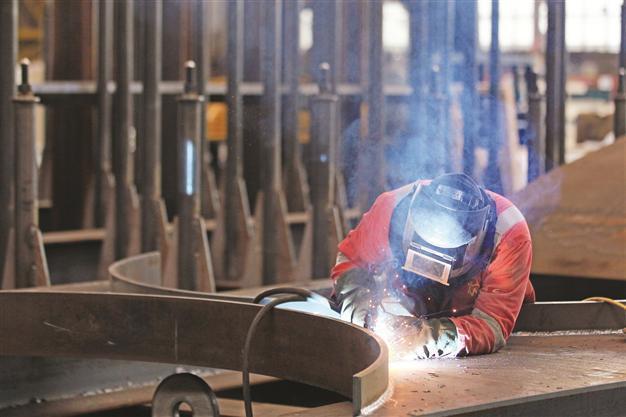Manufacturing growth in Britain slows sharply
LONDON - Reuters

The UK’s production of intermediate goods, such as car engines, and investment goods like
factory equipment, rose in March, says a recent survey. AFP photo
British manufacturing output barely grew at all in April as an economic slowdown in the eurozone curbed demand for goods made in
Britain, a survey showed yesterday, raising the risk of a longer recession.
The unexpectedly sharp slowdown is fuelling a debate over the chances of further monetary stimulus from the Bank of England (BoE), after central bankers hinted that they might not extend their asset purchases later this month following a run of stronger economic data and sticky inflation.
Sterling fell against the dollar and euro after the PMI release.
Before local electionsThe weak Markit/CIPS Manufacturing Purchasing Managers’ Index (PMI) also cranks up the heat on the governing Conservatives and Liberal Democrats, grappling with a shrinking economy and a series of political blunders as they go into local elections tomorrow, a test of popular support.
The manufacturing PMI dropped to 50.5 in April from a downwardly revised 51.9 in March, keeping the sector just above the 50 level which separates growth from contraction.
“It’s all apiece with recent data, which tells us that the economy is weak and likely to remain so for some time,” said Peter Dixon, economist at Commerzbank.
The reading, the lowest since December, fell short of economists’ forecasts for a dip to 51.5 and lent some credence to disputed official data that showed an economic contraction in Britain in early 2012, tipping the country back into recession.
The BoE and many economists have argued that the official figures understate the economy’s true strength, pointing to more upbeat evidence from surveys, including earlier PMIs.
In other quarters the mood is more somber. The chief executive of British bank Lloyds warned yesterday of a “long and difficult” path to economic recovery in Britain.
“We think that the economy will be reasonably flat this year, but it is going to be a long and difficult recovery,” Antonio Horta-Osorio said. “We expect it to recover to growth in 2013 and expect unemployment to peak at close to 9 percent by early next year.”
The weakness in manufacturing was replicated in Britain’s small neighbor Ireland, where growth in the sector almost ground to a halt in March as output fell.
Economic fortunes were better further afield, with China’s official PMI rising to a 13-month high in April, signaling that economy has found its footing and may be recovering from a first-quarter trough.
Britain’s economy has not fully recovered from the steep slump caused by the 2007-2009 financial crisis and is stuck in what some economist already describe as a depression.
First drop in orders since November British manufacturing output did expand for the fifth consecutive month in April, but it was at the weakest pace since December, partly due to the sharpest fall in new export orders since May 2009, Markit said.
The index measuring overall new orders dropped for the first time since November, with manufacturers blaming sluggish overseas demand and strong competition.
And a strengthening in sterling to its highest in more than two and a half years on a trade-weighted basis poses another threat to exporters by either sapping foreign demand for British wares or squeezing firms’ profits via lower prices.
Production of consumer goods fell, while output of intermediate goods, such as car engine, and investment goods, such as factory equipment, both rose.
